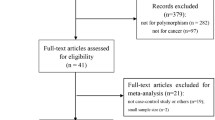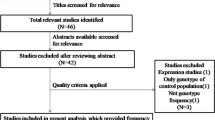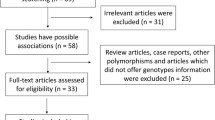Abstract
Expression pattern analysis has been revealed that glutathione S-transferase omega 2 (GSTO2, a member of class omega) is ubiquitously expressed. Over expression of GSTO2 induced apoptosis. The gene encoding GSTO2 was localized to human chromosome 10q24.3, a region that may harbor gene(s) involved in the developing of colorectal cancer. To investigate the association between GSTO2 N142D genetic polymorphism and susceptibility to colorectal cancer the present study was done. We studied 63 (26 females, 37 males) colorectal cancer patients and 126 (52 females, 74 males) healthy individuals. The control subjects were frequency matched for age and gender with the colorectal cancer group. The genotypes were performed using RFLP-PCR method. The ND and DD genotypes were not associated with risk of colorectal cancer, in comparison with the NN genotype. Family history for cancer in the first degree of relatives significantly differed between cases and controls (P = 0.012). The profiles of GSTO2 genotypes and family history in control and cancerous groups were compared to each other. Subjects with NN genotype and positive family history significantly were at high risk to develop colorectal cancer in comparison with subjects with DD or ND genotypes and negative family history (P = 0.003). Present findings indicating that GSTO2 NN genotype increase the risk of colorectal cancer in persons with positive family history for cancer in the first degree relatives.
Similar content being viewed by others
References
Hayes JD, Flanagan JU, Jowsey IR (2005) Glutathione transferases. Annu Rev Pharmacol Toxicol 45:51–88
Ketterer B (1988) The protective role of glutathione and glutathione transferases in mutagenesis and carcinogenesis. Mutat Res 202:343–361
Board PG, Coggan M, Chelvanayagam G et al (2000) Identification, characterization, and crystal structure of the Omega class glutathione transferases. J Biol Chem 275:24798–24806
Wang L, Xu J, Ji C et al (2005) Cloning, expression and characterization of human glutathione S-transferase omega 2. Int J Mol Med 16:19–27
Zakharyan RA, Sampayo-Reyes A, Healy SM et al (2001) Human monomethylarsonic acid (MMA(V)) reductase is a member of the glutathione-S-transferase superfamily. Chem Res Toxicol 14:1051–1057
Whitbread AK, Tetlow N, Eyre HJ et al (2003) Characterization of the human omega class glutathione transferase genes and associated polymorphisms. Pharmacogenetics 13:131–144
Mukherjee B, Salavaggione OE, Pelleymounter LL et al (2006) Glutathione S-transferase omega 1 and omega 2 pharmacogenomics. Drug Metab Dispos 34:1237–1246
Takeshita H, Fujihara J, Takastuka H et al (2009) Diversity of glutathione S-transferase omega 1 (A140D) and 2 (N142D) gene polymorphisms in worldwide populations. Clin Exp Pharmacol Physiol 36:283–286
Rafiee L, Saadat I, Saadat M (2010) Glutathione S-transferase genetic polymorphisms (GSTM1, GSTT1 and GSTO2) in three Iranian populations. Mol Biol Rep 37:155–158
Mo Z, Gao Y, Cao Y et al (2009) An updating meta-analysis of the GSTM1, GSTT1, and GSTP1 polymorphisms and prostate cancer: a Huge review. Prostate 69:662–688
Saadat M (2006) Genetic polymorphisms of glutathione S-transferase T1 (GSTT1) and susceptibility to gastric cancer: a meta-analysis. Cancer Sci 97:505–509
Zhuo W, Wang Y, Zhuo X et al (2009) CYP1A1 and GSTM1 polymorphisms and oral cancer risk: association studies via evidence-based meta-analyses. Cancer Invest 27:86–95
Altinisik J, Balta ZB, Aydin G et al (2010) Investigation of glutathione S-transferase M1 and T1 deletions in lung cancer. Mol Biol Rep 37:263–267
Marahatta SB, Punyarit P, Bhudisawasdi V et al (2006) Polymorphism of glutathione S-transferase omega gene and risk of cancer. Cancer Lett 236:276–281
Pongstaporn W, Pakakasama S, Sanguansin S et al (2009) Polymorphism of glutathione S-transferase omega gene: association with risk of childhood acute lymphblastic leukemia. J Cancer Res Clin Oncol 135:673–678
Leite JL, Morari EC, Granja F et al (2007) Influence of the glutathione S-transferase gene polymorphisms on the susceptibility to basal cell skin carcinoma. Rev Med Chil 135:301–306
Masoudi M, Saadat I, Omidvari S et al (2009) Genetic polymorphisms of GSTO2, GSTM1, and GSTT1 and risk of gastric cancer. Mol Biol Rep 36:781–784
Morari EC, Lima AB, Bufalo NE et al (2006) Role of glutathione S-transferase and codon 72 of P53 genotypes in epithelial ovarian cancer patients. J Cancer Res Clin Oncol 132:521–528
Pongstaporn W, Rochanawutanon M, Wilailak S et al (2006) Genetic alterations in chromosome 10q24.3 and glutathione S-transferase omega 2 gene polymorphism in ovarian cancer. J Exp Clin Cancer Res 25:107–114
Masoudi M, Saadat I, Omidvari S et al (2010) Additive effects of genetic variations of xenobiotic detoxification enzymes and DNA repair gene XRCC1 on the susceptibility to breast cancer. Breast Cancer Res Treat 120:263–265
Masoudi M, Saadat M (2008) Arsenic, GSTO2 Asn142Asp polymorphism, health and treatment. EXCLI J 7:115–118
Struski S, Doco-Fenzy M, Cornillet-Lefebvre P (2002) Compilation of published comparative genome hybridization studies. Cancer Genet Cytogenet 135:63–90
Karoui M, Tresallet C, Julie C et al (2004) Loss of heterozygosity on 10q and mutational status of PTEN and BMPR1A in colorectal primary tumors and metastases. Br J Cancer 90:1230–1234
Zheng HT, Peng ZH, Zhou CZ et al (2005) Refined mapping of loss heterozygosity on 10q23–24 in sporadic colorectal carcinoma. Zhonghua Yi Xue Za Zhi 85:2124–2127
Mohamadynejad P, Saadat M (2008) Genetic polymorphisms of XRCC1 (at codons 194 and 399) in Shiraz population (Fars province, southern Iran). Mol Biol Rep 35:669–672
Bazrgar M, Karimi M, Fathzadeh M et al (2008) Apolipoprotein E polymorphism in Southern Iran: E4 allele in the lowest reported amounts. Mol Biol Rep 35:495–499
Fletcher RW, Fletcher SW (2005) Clinical epidemiology: the essential, 4th edn. Lippincott Williams & Wilkins, Baltimore
Schmuck EM, Board PG, Whitbread AK et al (2005) Characterization of the monomethylarsonate reductase and dehydroascorbate reductase activities of omega class glutathione transferase variants: implications for arsenic metabolism and the age-at-onset of Alzheimer’s and Parkinson’s diseases. Pharmacogenet Genomics 15:493–501
Hu Z, Ma H, Chen F et al (2005) XRCC1 polymorphisms and cancer risk: a meta-analysis of 38 case–control studies. Cancer Epidemiol Biomarkers Prev 14:1810–1818
Saadat M, Ansari-Lari M (2009) Polymorphism of XRCC1 (at codon 399) and susceptibility to breast cancer: a meta-analysis of the literatures. Breast Cancer Res Treat 115:137–144
Saadat M (2010) Haplotype analysis of XRCC1 (at codons 194 and 399) and susceptibility to breast cancer: a meta-analysis of the literatures. Breast Cancer Res Treat 124:785–791
Acknowledgments
The authors are indebted to the participants for their close cooperation. The authors are indebted to Dr. Hassan Mohabatkar for critical reading of the manuscript and Dr. Maryam Ansari-Lari for her contribution in discussion. This study was supported by Shiraz University.
Conflict of interest
None
Author information
Authors and Affiliations
Corresponding author
Rights and permissions
About this article
Cite this article
Masoudi, M., Saadat, I., Omidvari, S. et al. Association between N142D genetic polymorphism of GSTO2 and susceptibility to colorectal cancer. Mol Biol Rep 38, 4309–4313 (2011). https://doi.org/10.1007/s11033-010-0555-7
Received:
Accepted:
Published:
Issue Date:
DOI: https://doi.org/10.1007/s11033-010-0555-7




